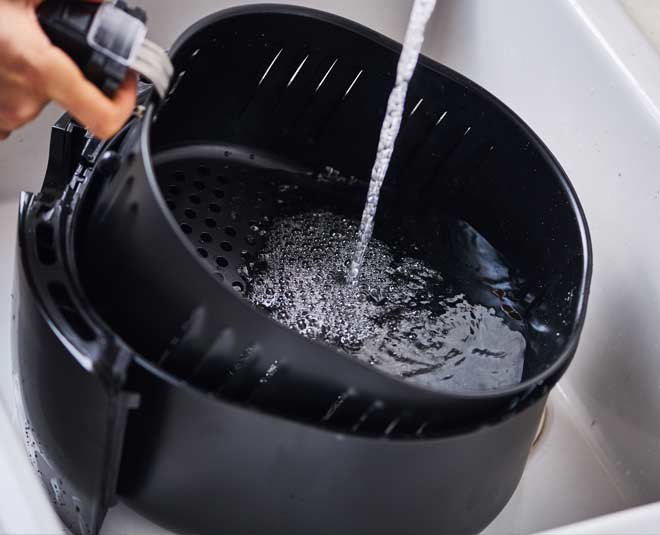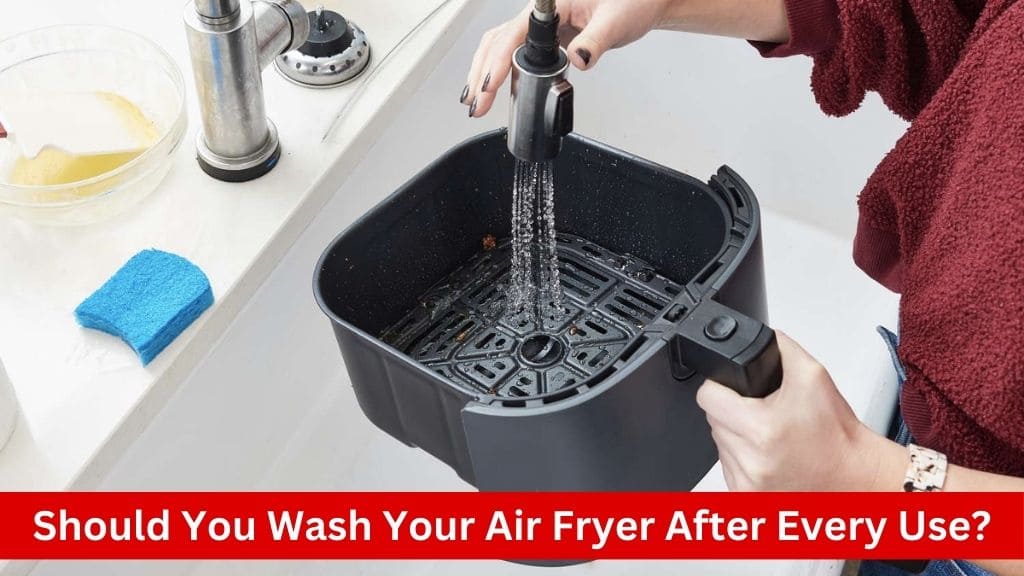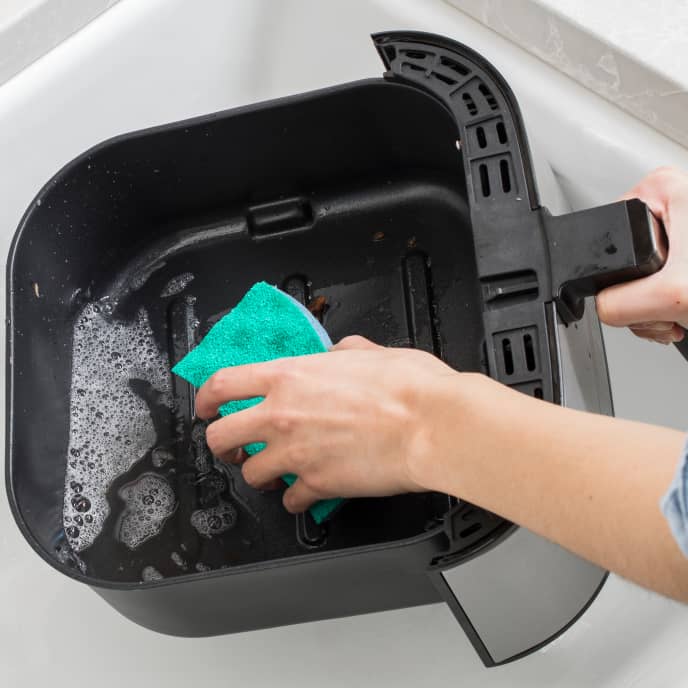In recent years, air fryers have gained immense popularity for their ability to cook delicious, crispy food with significantly less oil than traditional frying methods. However, with great convenience comes the responsibility of maintenance. One common question that arises among air fryer owners is whether they should wash their appliance after every use. In this comprehensive guide, we’ll delve into the reasons why washing your air fryer after each use may be beneficial, considerations for frequency, and tips for effective cleaning.
Understanding the Importance of Cleaning
:max_bytes(150000):strip_icc()/faw-toaster-ovens-air-fryers-test-chefman-3-7qt-turbofry-rkilgore-111-487d903950824b019a89d671ec68e254.jpg)
Food Safety
Ensuring proper hygiene in your kitchen appliances is paramount for food safety. When you cook in your air fryer, food residues, oils, and grease can accumulate on the surfaces, especially in the cooking basket and tray. If left uncleaned, these residues become a breeding ground for bacteria and other pathogens. Subsequent use of the air fryer without proper cleaning can transfer these contaminants to your food, increasing the risk of foodborne illnesses.
Regular cleaning helps eliminate these residues, preventing bacterial growth and ensuring that your meals are safe to eat. It’s particularly crucial if you cook raw meats, poultry, or seafood in your air fryer, as these foods carry a higher risk of bacterial contamination.
Prolonging Appliance Lifespan
Just like any other kitchen appliance, your air fryer requires proper maintenance to function optimally and last longer. When food residues accumulate on the surfaces, they can become burnt or baked onto the appliance, especially during the cooking process. Over time, this buildup can damage the non-stick coating, heating elements, and other components of the air fryer.
Regular cleaning prevents residue buildup, prolonging the lifespan of your air fryer and preserving its performance. It also reduces the need for more intensive cleaning or repairs down the line, saving you time and money in the long run.
Prevention of Odors and Flavors
Food residues left in the air fryer can impart unwanted odors and flavors to subsequent meals. For example, if you cook fish in your air fryer without cleaning it afterward, the lingering fish smell can affect the taste of the next batch of food you cook, even if it’s something entirely different like cookies or vegetables.
Cleaning your air fryer after each use helps prevent flavor transfer and ensures that your food tastes fresh every time. It also helps maintain the integrity of different flavors and prevents them from mixing or becoming contaminated.
Frequency of Cleaning: Factors to Consider

Frequency of Use
The frequency at which you use your air fryer is perhaps the most significant factor in determining how often it should be cleaned. If you use your air fryer daily or multiple times a week, food residues are likely to accumulate more quickly, requiring more frequent cleaning to maintain cleanliness and prevent bacterial growth.
On the other hand, if you only use your air fryer occasionally or infrequently, you may be able to get away with cleaning it less frequently. However, it’s essential to assess the condition of the appliance after each use and clean it promptly if you notice any residue buildup or lingering odors.
Types of Foods Cooked
The types of foods you cook in your air fryer can also influence how often it needs to be cleaned. Certain foods, such as those with high fat content or sticky sauces, are more likely to leave behind residues that can accumulate and become difficult to remove over time.
For example, if you frequently cook greasy foods like chicken wings or bacon in your air fryer, you may need to clean it more often to prevent the buildup of grease and oils. Similarly, if you cook foods with sticky sauces or marinades, such as BBQ ribs or teriyaki chicken, you may need to clean the appliance more frequently to remove any residue left behind.
Personal Hygiene Preferences
Individual hygiene preferences also play a role in determining how often you may choose to clean your air fryer. Some individuals may have higher cleanliness standards and prefer to wash the appliance after every use, regardless of the frequency or types of foods cooked.
Others may be more lenient and comfortable with less frequent cleaning, especially if they prioritize convenience or have busy schedules. However, it’s essential to strike a balance between personal preferences and maintaining proper hygiene to ensure the safety and cleanliness of your air fryer.
Tips for Effective Cleaning
Wait for Cool Down
Before you begin cleaning your air fryer, ensure that it has cooled down completely. Attempting to clean a hot appliance can increase the risk of burns and accidents. Allow the air fryer to cool down for at least 30 minutes after use before starting the cleaning process.
Use Mild Detergents
When cleaning your air fryer, opt for mild dish soap or detergent to avoid damaging its surfaces. Harsh chemicals or abrasive cleaners can scratch the appliance’s non-stick coating and other components. Instead, use a gentle detergent and warm water to clean the interior and exterior surfaces of the air fryer.
Focus on Key Areas
Pay particular attention to areas prone to residue buildup, such as the cooking basket, tray, and heating element. Use a soft sponge or cloth to scrub these areas gently, ensuring that all food residues and grease are removed. For stubborn stains or residues, you can use a paste of baking soda and water to help loosen them before scrubbing.
Consider Removable Parts
If your air fryer has removable parts, such as a cooking basket or tray, remove them for easier cleaning. These parts can often be washed with warm, soapy water or placed in the dishwasher, depending on the manufacturer’s instructions. Cleaning removable parts separately ensures that you can clean them thoroughly and reach all surfaces.
Regular Maintenance
In addition to cleaning the air fryer after each use, incorporate regular maintenance tasks into your routine. Inspect the appliance for any signs of wear or damage, such as worn-out non-stick coating or loose parts. Addressing these issues promptly can help prevent further damage and ensure the continued functionality of the air fryer.
Pay Attention to Accessories
Don’t forget to clean any accessories or attachments that come with your air fryer, such as racks or skewers. These accessories can accumulate food residues and grease during use and may require separate cleaning to ensure proper hygiene.
Dry Thoroughly
After cleaning, ensure that all parts of the air fryer are dried thoroughly before reassembling and storing the appliance. Use a clean, dry cloth to wipe down all surfaces and allow any removable parts to air dry completely before returning them to the air fryer. Moisture left behind can promote mold growth and affect the appliance’s performance.
Conclusion
Washing your air fryer after every use is generally recommended to maintain food safety, prolong appliance lifespan, and prevent unwanted odors and flavors. However, the frequency of cleaning may vary depending on factors such as usage patterns, types of foods cooked, and personal preferences. By following proper cleaning techniques and incorporating regular maintenance into your routine, you can ensure that your air fryer remains in optimal condition for years to come.


